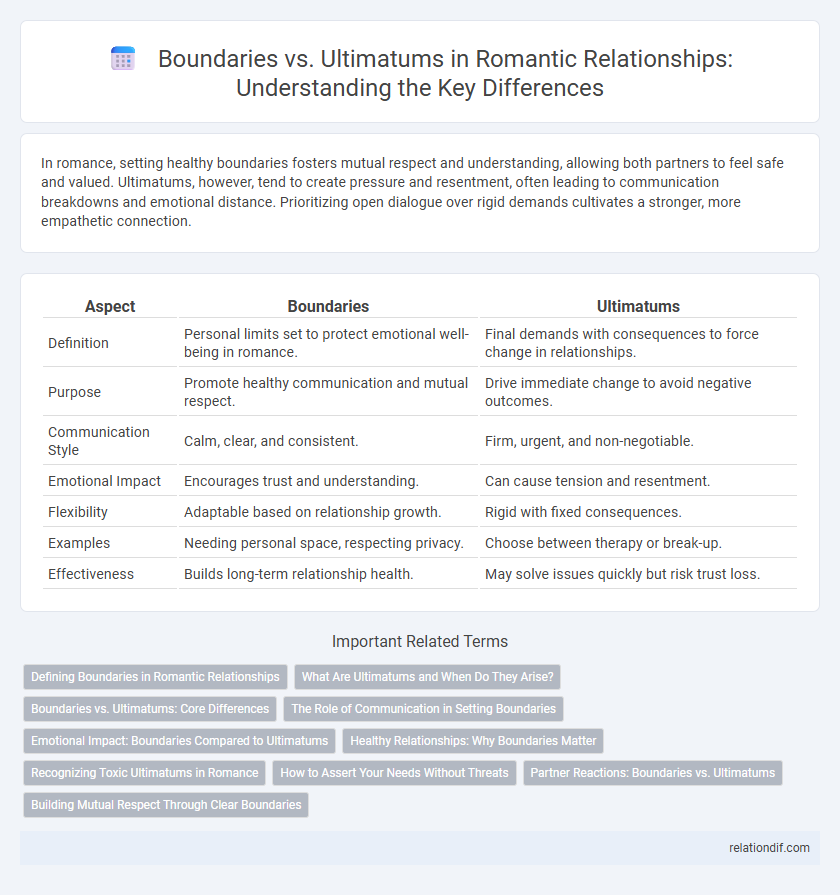In romance, setting healthy boundaries fosters mutual respect and understanding, allowing both partners to feel safe and valued. Ultimatums, however, tend to create pressure and resentment, often leading to communication breakdowns and emotional distance. Prioritizing open dialogue over rigid demands cultivates a stronger, more empathetic connection.
Table of Comparison
| Aspect | Boundaries | Ultimatums |
|---|---|---|
| Definition | Personal limits set to protect emotional well-being in romance. | Final demands with consequences to force change in relationships. |
| Purpose | Promote healthy communication and mutual respect. | Drive immediate change to avoid negative outcomes. |
| Communication Style | Calm, clear, and consistent. | Firm, urgent, and non-negotiable. |
| Emotional Impact | Encourages trust and understanding. | Can cause tension and resentment. |
| Flexibility | Adaptable based on relationship growth. | Rigid with fixed consequences. |
| Examples | Needing personal space, respecting privacy. | Choose between therapy or break-up. |
| Effectiveness | Builds long-term relationship health. | May solve issues quickly but risk trust loss. |
Defining Boundaries in Romantic Relationships
Defining boundaries in romantic relationships involves clearly communicating personal limits and expectations to foster mutual respect and emotional safety. Establishing healthy boundaries helps partners understand acceptable behaviors, reducing conflicts and nurturing trust. Unlike ultimatums, which can pressure and strain the relationship, boundaries are proactive guidelines that support both individuals' well-being and connection.
What Are Ultimatums and When Do They Arise?
Ultimatums in romance are firm demands accompanied by consequences if unmet, often emerging during moments of heightened conflict or unresolved issues. They arise when one partner seeks immediate change to protect emotional well-being or relationship stability but risk creating power imbalances. Understanding the difference between healthy boundaries and rigid ultimatums is essential for fostering mutual respect and effective communication in intimate relationships.
Boundaries vs. Ultimatums: Core Differences
Boundaries in romance establish personal limits that promote respect and healthy communication, allowing partners to express needs without threat. Ultimatums, by contrast, impose rigid demands that can create fear, resentment, and power imbalances, often undermining trust. Understanding these core differences helps couples maintain autonomy while fostering mutual respect and emotional safety.
The Role of Communication in Setting Boundaries
Effective communication plays a crucial role in setting boundaries within romantic relationships by fostering mutual understanding and respect. Clear, honest dialogue helps partners express their needs and limits without resorting to ultimatums, which often create tension and resistance. Establishing boundaries through open communication promotes emotional safety and strengthens the connection by ensuring both individuals feel heard and valued.
Emotional Impact: Boundaries Compared to Ultimatums
Boundaries establish clear, respectful limits that foster trust and emotional safety by promoting open communication and mutual understanding in romantic relationships. Ultimatums create pressure and fear, often leading to resentment or emotional disconnect due to their rigid, demanding nature. Emotional impact differs significantly as boundaries encourage healthy connection, while ultimatums can damage intimacy and trigger defensive responses.
Healthy Relationships: Why Boundaries Matter
Setting clear boundaries in romantic relationships fosters mutual respect and personal well-being, distinguishing them from ultimatums that often breed resentment and conflict. Healthy boundaries promote open communication, allowing partners to express needs and maintain individuality without fear of manipulation or control. Recognizing and respecting these limits is essential for long-term trust and emotional intimacy between partners.
Recognizing Toxic Ultimatums in Romance
Recognizing toxic ultimatums in romance involves identifying demands that manipulate or coerce a partner into decision-making under pressure, often threatening relationship stability. Healthy boundaries respect individual autonomy and promote mutual understanding, whereas toxic ultimatums erode trust and create an imbalance of power. Awareness of signs such as emotional blackmail, rigid demands, and lack of compromise is essential for maintaining a nurturing and respectful romantic connection.
How to Assert Your Needs Without Threats
Asserting your needs in a romantic relationship requires clear communication and respect for both partners' boundaries, ensuring requests are expressed without imposing ultimatums or threats. Emphasizing personal feelings and desires rather than demands fosters open dialogue and mutual understanding. Maintaining this approach helps build trust and encourages compromise, strengthening the emotional connection without creating fear or resentment.
Partner Reactions: Boundaries vs. Ultimatums
Partners often respond more positively to clearly communicated boundaries because they foster mutual respect and open dialogue, whereas ultimatums tend to provoke defensiveness and resentment, undermining trust. Establishing boundaries encourages healthy emotional connection and collaborative problem-solving, while ultimatums typically create power imbalances and force compliance. Effective relationship dynamics rely on understanding that boundaries promote growth, whereas ultimatums can damage intimacy and long-term commitment.
Building Mutual Respect Through Clear Boundaries
Establishing clear boundaries in a romantic relationship fosters mutual respect by defining personal needs and limits without demanding compliance, unlike ultimatums that often trigger resistance and resentment. Boundaries promote open communication and trust, enabling partners to understand and honor each other's emotional and physical space. Prioritizing boundaries over ultimatums creates a healthier dynamic where respect is built on consent and empathy rather than control.
Boundaries vs Ultimatums Infographic

 relationdif.com
relationdif.com